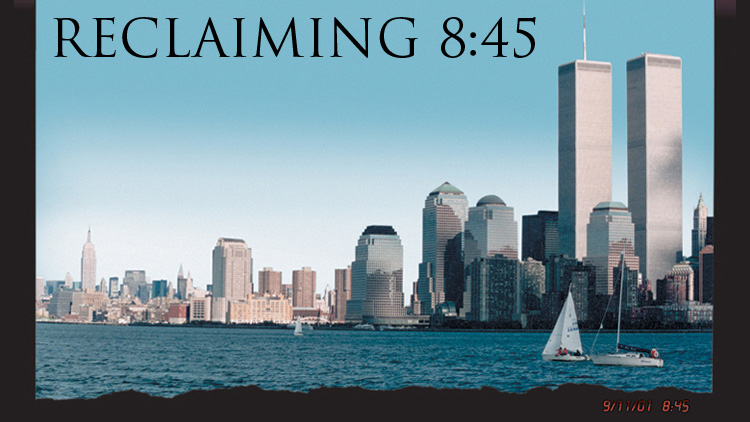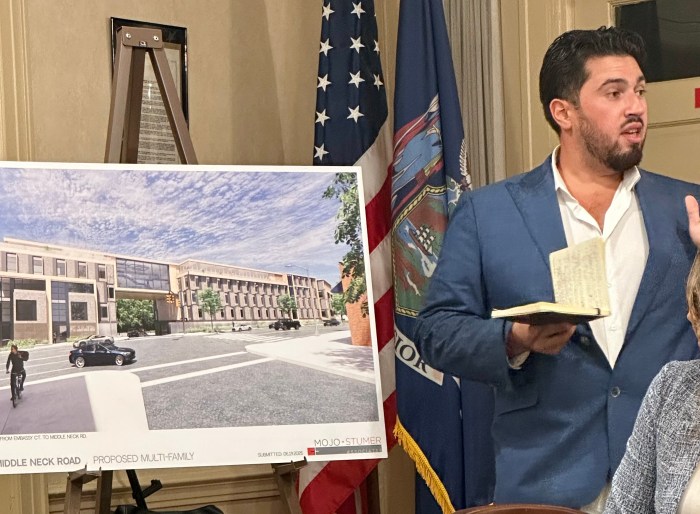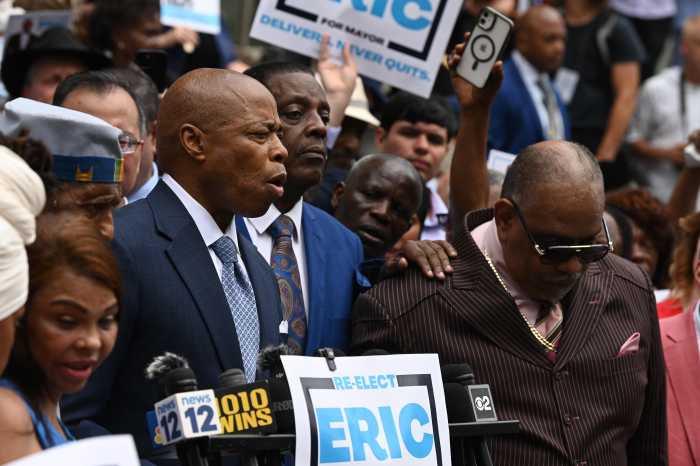We all know where we were when we first heard the news that America was being attacked. It is hard to accept that the day even happened, much less that so many years have already passed. So on this anniversary of the Sept. 11, 2001 attacks, the Press has decided to reprint a column written by former Editor-in-chief Robbie Woliver on the second anniversary of 9/11. It takes a glimpse of how the day began – normal, uneventful – and by the time the sun had set, the world had been set on its side, forever altered.
There have been moments in our history when time was blindsided. One vivid example was when the atomic bomb was dropped on Hiroshima and scorched shadows of simple things—trees, flowers, architecture, humanity—forever, indelibly searing the images into their surroundings. Another was on September 11th, 2001, when our perception of time was snatched, held at bay and returned to us broken, scattered and forever reset.
When asked, “Where were you when it happened?” we all remember vividly. We recall the room we were in, what we ate for breakfast, the specks of lint we tried to remove from our clothes before work, who broke the news to us first. But what we forgot was the greater world around us. We lost our anchor point—the here and now. Post 9/11 became a new era marker, like B.C or A.D. Suddenly, very little existed before that day.
September 11th was to be a day that very much revolved around the future. Primaries were to be held on Long Island and in New York City. Michael Jordan announced that he was coming out of retirement. Mariah Carey was poised for a post-breakdown comeback. Dr. Will was battling Nicole for the $500,000 Big Brother 2 grand prize. Important things. But sometime during breakfast, or the morning shower, or the commute to work, or the coffee break, or first-period English, the clocks stopped.
As with generations before us, we turned to the media, glued to the TV, enduring hours on end of that plane slamming into that building. Time was so skewed, it’s almost impossible to remember anything else. Think back to that time and you’ll hear Enya’s “Only Time” as its soundtrack, but what was the No. 1 song blaring at 8 a.m. that morning on radios across the country? What was life like prior to that devastating moment? What were we talking about at the water cooler? Looking back, an exercise in post-traumatic stress memory recall, is also the need to remember what might have been.
You may very well remember the shirt you wore that day, but it is hard to recall the news of the world before that moment at 8:46:26 a.m., when time became twisted. It seems like a year ago, it seems like yesterday, it seems like a lifetime ago.
On Tuesday, September 11th, 2001, many Long Islanders greeted the clear, beautiful morning by picking up their newspapers from their driveways. Many of us looked at the sky, not sensing the impending doom that would soon traverse it, but rather to marvel at an unusually brilliant azure awning. Sitting at the kitchen table, some of us glanced at Newsday’s headline, “Israel’s New Fear: The Enemy Within,” shook our heads and felt compassion for Middle Easterners, wondering how they live day to day under the threat of constant violence, but still quietly pleased that terrorism was something that struck there and not here.
On Tuesday, September 11th, 2001, zip code 11048 ceased to exist, and thousands of people who went to work there thinking they would return home did not.
HEROES AND VILLAINS
Some Long Islanders were watching News 12, waiting for local traffic reports and weather. The news that day was basically about the primaries. Glen Cove Mayor Tom Suozzi was running against State Assemb. Tom DiNapoli (D-Great Neck) for Nassau County Executive in the Democratic primary. Lizzie Grubman was big news, as was Gary Condit and his then-missing-now-murdered intern Chandra Levy. News 12 ran a story on immigrants in Farmingville, all part of its morning package.
“A confident Suozzi, out to convince voters that what Nassau needs is a CEO,” was the track over News 12’s story on the Nassau County Executive race, a story which featured both candidates encouraging their supporters to come out and vote.
Anchor Carol Silva: “We’re still waiting for a ruling from a grand jury about whether celebrity publicist Lizzie Grubman will be indicted on criminal charges.” Grubman’s was a small accident. An SUV. A few injuries.
Terry Sherwood, a stay-at-home mother who has become an activist fighting against the illegal day laborers who moved to Farmingville from Central and South accusing the immigrants of everything from disturbing traffic to manslaughter and sex abuse. Suffolk Police Inspector Kenneth Rau disputed that accusation, showing crime statistics which indicated that since 1999, only about 6 percent of the arrests made in Farmingville had involved non-citizens. Sherwood’s exclamation of “we are not racists,” in her local war, was soon to be lost to a greater battle.
Newsday had, perhaps, one of its most foreboding stories of the day: its coverage of that past weekend’s Great Irish Fair, by freelancer Sorah Shapiro. Fairgoers commemorated the memory of Brian Fahey, Harry Ford and John Downing, the Queens firefighters who died in the line of duty in what is now known as the Father’s Day Fire. The story ended with a quote from a fair participant, Maryann Owens: “Their memory should not be forgotten when this event is over.” Two of those firefighters were from Rescue Company No. 4 in Woodside, Queens. They would lose another nine firefighters just three months later, on September 11th, two days after the fair.
THE EMPEROR’S OLD CLOTHES
The most dramatic instance of how time and perception collided involved Mayor Rudolph Giuliani, who was perceived 180 degrees differently on the morning preceding the attacks than he would be hours later. He had very little clout in the impending New York City primary. Although he fared well in the polls, he was a much-disliked mayor in many circles. He fought with the Patrolmen’s Benevolent Association, he fought with civilians over police brutality. He seemed harsh and unfeeling. Homeless, get them off the streets; poor, raise their rents. The minority communities didn’t trust him one bit. He attempted to shut down publicly funded museums over exhibits that were offensive to him. He alienated the governor of Virginia, insisting that the state for lovers should become the storehouse for New York’s garbage. He was the embodiment of the arrogant New Yorker. Dictatorial. Uncaring, they said. But he was always taken seriously. Until the sex scandal.
With word of his divorce and his public dalliance with his then-mistress, now-wife, Judith Nathan, this dead-serious straightarrow politician, seemingly overnight, became a laughingstock. He was about to leave office under disreputable conditions. The June headlines blazed “Rudy’s Secret Love Nest,” “Rudy’s Gal Pal,” “Rudy as Caesar” (after the emperor who moved his mistress, Cleopatra, into one of his houses). “No Grace at Gracie Mansion,” said Time magazine. This was not the legacy he wanted. Even leaving as the Heartless Mayor would have been better.
There might not have been grace in the mayor’s mansion, but there certainly was an abundance on late September 11th. Rudolph Giuliani showed compassion and strength in a way totally unexpected from him. All those jokes, all that bad blood of the past, all was erased when time warped. All love-nest talk quickly turned into a love fest. The past was forgotten or, at least, forgiven.
Before we knew it, the anti-Giuliani wave led by mayoral candidate Fernando Ferrer was drowned out by Michael Bloomberg, whom many thought would never see the mayorship. In the Sept. 10 issue of New York Magazine, Michael Tomasky wrote: “I assume it’s become apparent to Giuliani that Mike Bloomberg won’t be the next mayor. More generally, Rudy is protecting what he sees as his legacy. If there’s one thing a lameduck politician can smell…it’s the thick odor of his own obsolescence.” But Rudy Giuliani, who had been diminished as mayor, mired in a sex scandal, would soon become Man of the Year.
And as with its mayor, New Yorkers would also become beloved. Even the Yankees and Mets were cheered on the road. Emotion filled the void time left behind when it was snatched. And life, particularly, here in New York, started from scratch.

THE WAY IT SHOULD HAVE BEEN
That Tuesday in September was to be a day that would see the Latin Grammys, wracked by controversy, holding their second annual awards show in Los Angeles, after moving the event from Aug. 20 in Miami for security reasons for fear of anti-Cuban demonstrations. It was the release date for Bob Dylan’s Love & Theft and Mariah Carey’s Glitter. The No. 1 song was “I’m Real” by Jennifer Lopez and Ja Rule. The top movie was Shrek, and Big Brother 2, Jag and Judging Amy were the TV programs that would have been watched that evening. The Mind of the Married Man, an R-rated comedy series about a Chicago newspaper columnist getting bored with his wife, was to premiere that evening on HBO
WHAT LIFE WAS ALL ABOUT IN SEPTEMBER 2001, AND THE BIG STORIES ON THE MORNING OF SEPTEMBER 11TH. THESE WERE THE HEADLINES
• Michael Jordan poised to make NBA comeback with the Washington Wizards.
• Israeli and Palestinian leaders to hold truce talks later that day.
• Elizabeth Dole expected to announce run for Jesse Helms’ North Carolina Senate seat.
• California grand jury will not investigate complaint against Congressman Gary Condit in the missing intern case; a grand jury rejected a flight attendant’s complaint that Condit obstructed justice by allegedly asking her to sign an affidavit stating they didn’t have an affair.
• Underage-drinking charge dropped against First Daughter Barbara Bush.
• Experts say number of embryonic stem cells President Bush gave green light to is not enough.
• President Bush under increasing pressure to improve economy.
• Defense Secretary Rumsfeld trying to cut wasteful spending out of Pentagon.
• After a weeklong series of bomb blasts rock Jerusalem, for the first time, an Israeli Arab conducts a suicide bombing.
• New book by Newsweek reporter says Justice Souter could have convinced Justice Kennedy to allow recount of 2000 election had there been one more day.
• Responding to a chorus of concerns about rising unemployment and calls for action to fix a faltering economy, R. Glenn Hubbard, chairman of the President’s Council of Economic Advisors, announces, “We expect a recovery in the short run by the end of the year.”
• President Bush urges Congress to set aside partisan bickering and pass his education package, saying education is his top priority.
• Shark attacks in the Northeast continue, resulting in several deaths, including 10-year-old David Peltier, who dies after an attack off the Virginia coast.
• Firefighters work to get handle on massive Montana wildfires.
• Obituaries run for Dr. Christian Bernard (who performed first heart transplant), actor Troy Donahue and movie critic Pauline Kael.
• Janet Reno announces her intentions to run for governor of Florida.
• Cardinals rookie Bud Smith pitches a no-hitter.
• Manhunt in California for 20-year-old suspect in deadly shooting rampage in Sacramento ends after shooter kills himself.
• The Justice Department announces they will not try to break up Microsoft.
• President Bush says immigration reform bill unlikely by year’s end.
• West Nile virus spreads to L.A.
• 2001 MTV Music Video Awards honor Fat Boy Slim, ’N Sync for Pop and Christina Aguilera, Mya, Pink and Lil’ Kim for “Lady Marmalade.” As the music world continues to mourn 22-year-old R&B singer Aaliyah’s death a month earlier, an official report is
released stating that her plane was over the permissible weight capacity.
• Virgin, Utah passes ordinance making it illegal not to own gun.
• Controversy swirls around Little League World Series and its overage pitcher, Danny Almonte.
• Barry Bonds passes Roger Maris and Babe Ruth’s single-season home run marks.
• SAM 27000, former Air Force One, retired.
• A booklet of quotations, including derogatory jokes about women, Jews, Puerto Ricans and the borough of Queens, allegedly by Michael Bloomberg, compiled by a woman who worked for his financial information company in 1990, surfaces in time for primary.
• Hurricane Erin heads toward Bermuda.
• Heather Mercer and Dayna Curry, foreign aid and religious workers in Afghanistan, on trial for preaching Christianity. The case will be determined by Mullah Muhammed Omar, the seldom-seen supreme leader of the Taliban relatively unknown to Americans.
• Turning reflective on the primary elections, Giuliani says he’ll be happy to be out.
• Actress Anne Heche, former girlfriend of Ellen DeGeneres, discusses her marriage to a male cinematographer, and shocks the nation during an interview with Barbara Walters, talking about her incestuous relationship with her father, her battle with mental illness and her encounter with aliens.
• A Manhattan grand jury indicts a London-based Algerian, alleging he was one of the masterminds behind a plot to bomb the Los Angeles airport on the eve of the millennium.
• Ellis Henican, Newsday, Sept. 9, 2001: “Few people in city government will talk about this out loud. But there is a growing belief, in and out of the administration, that the lame-duck mayor [Giuliani] is purposely leaving some little explosions behind, just to make life miserable for whomever comes next.” One example: Closing the Staten Island landfill.
In two days the Fresh Kills Staten Island Landfill would become the repository for the remains and debris found at the World Trade Center Site. It would be another location where time clashed with history, changing the nature of a place, allowing an instant to turn a garbage dump into hallowed ground.


































